Critical Evaluation Report: Early Childhood Nutrition and Health
VerifiedAdded on 2023/01/04
|10
|2442
|29
Report
AI Summary
This report provides a critical analysis of three articles and a report, focusing on the eating habits of children and their impact on development and health. The report begins with an introduction highlighting the importance of early childhood nutrition and the prevalence of childhood obesity. The methodology and results section examines the evidence presented in each article, including semi-structured interviews, online surveys, and observational studies. The key messages of the articles are discussed, emphasizing the link between nutrition, eating habits, and physical activity in relation to child development and obesity. The quality of evidence for each article is evaluated, and the report identifies the best resource based on data and presentation. The conclusion summarizes the findings, emphasizing the importance of quality and quantity of nutrition in early childhood. The report highlights the role of healthy eating habits and physical activity in preventing childhood obesity and promoting overall health, with references to support the arguments.
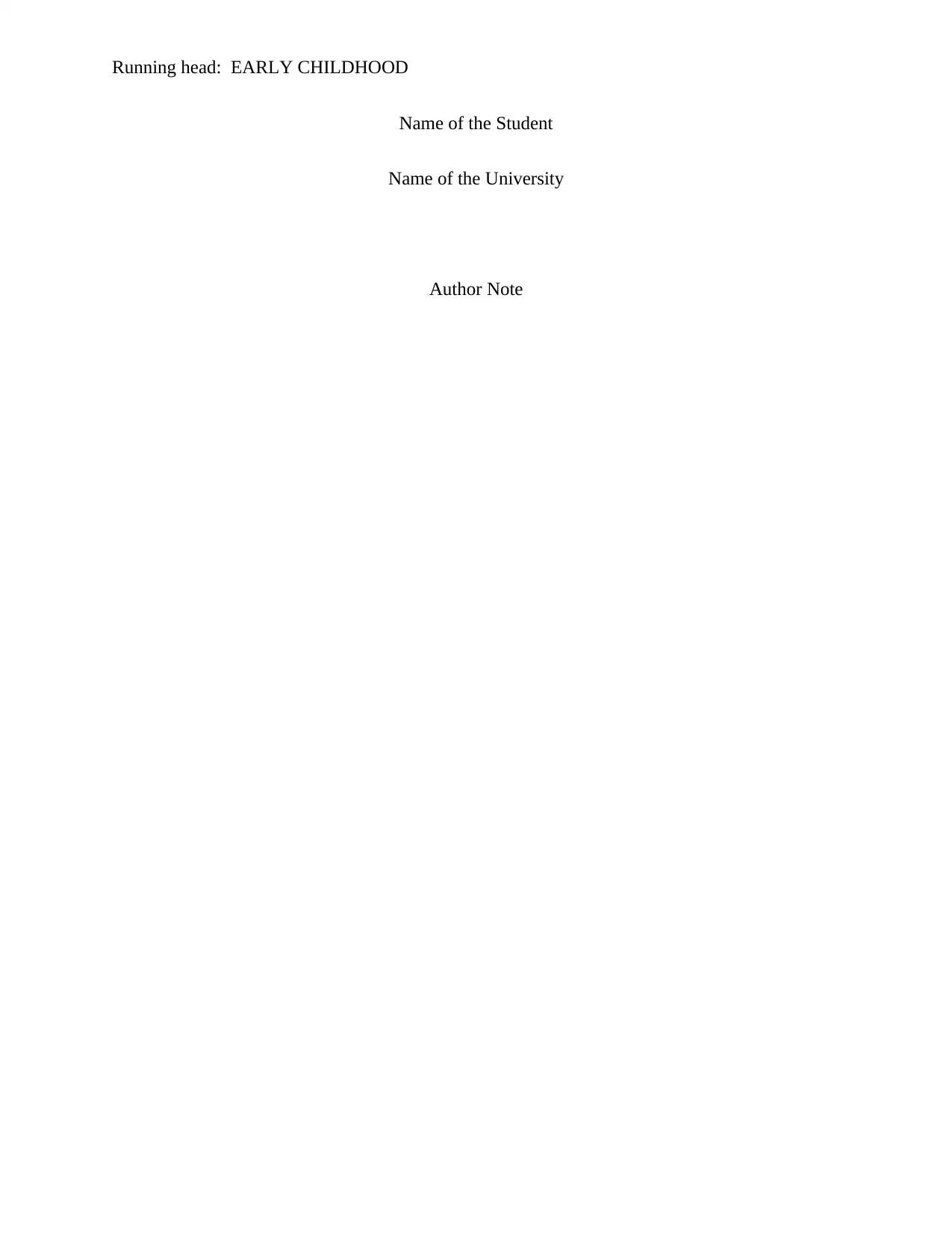
Running head: EARLY CHILDHOOD
Name of the Student
Name of the University
Author Note
Name of the Student
Name of the University
Author Note
Paraphrase This Document
Need a fresh take? Get an instant paraphrase of this document with our AI Paraphraser
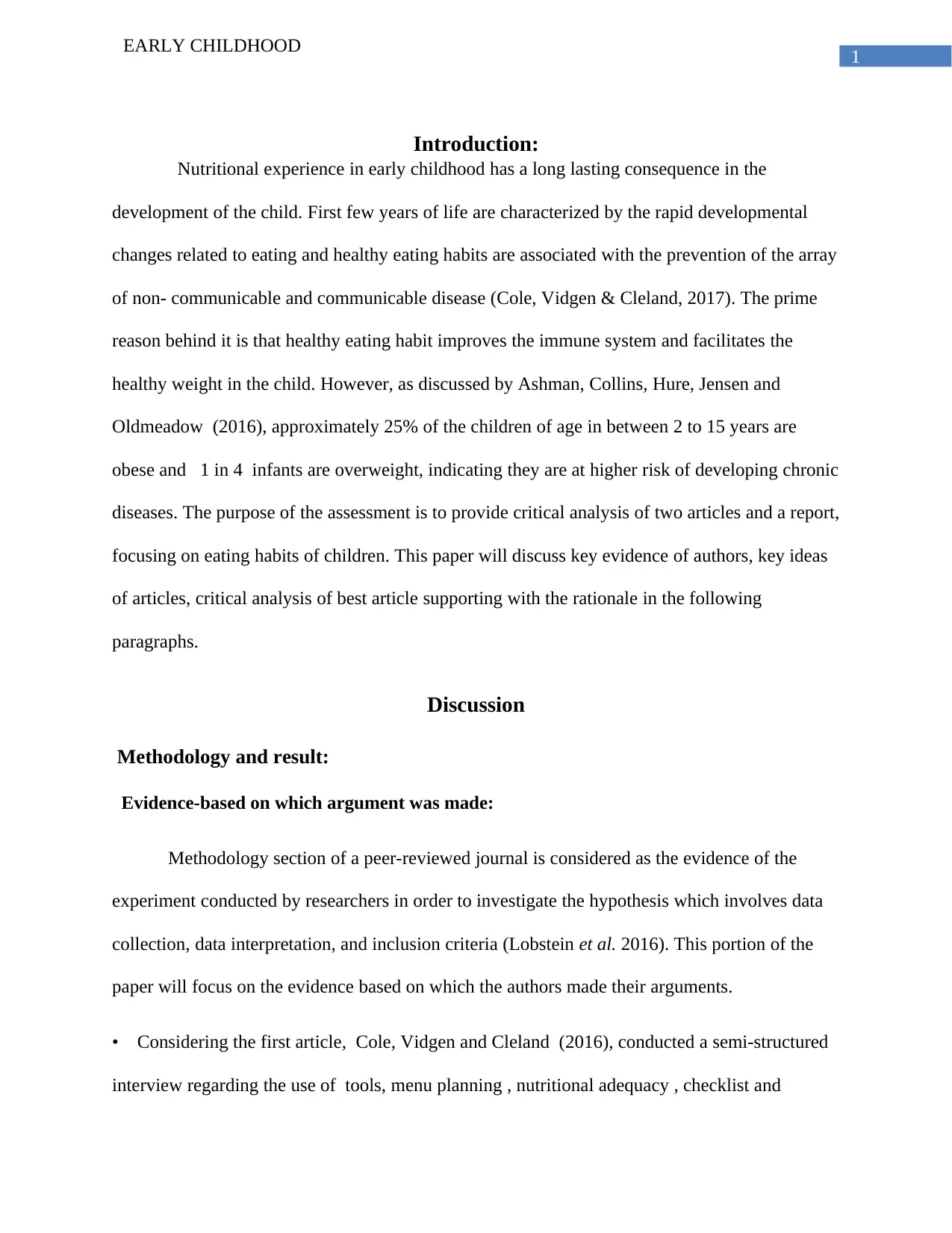
1
EARLY CHILDHOOD
Introduction:
Nutritional experience in early childhood has a long lasting consequence in the
development of the child. First few years of life are characterized by the rapid developmental
changes related to eating and healthy eating habits are associated with the prevention of the array
of non- communicable and communicable disease (Cole, Vidgen & Cleland, 2017). The prime
reason behind it is that healthy eating habit improves the immune system and facilitates the
healthy weight in the child. However, as discussed by Ashman, Collins, Hure, Jensen and
Oldmeadow (2016), approximately 25% of the children of age in between 2 to 15 years are
obese and 1 in 4 infants are overweight, indicating they are at higher risk of developing chronic
diseases. The purpose of the assessment is to provide critical analysis of two articles and a report,
focusing on eating habits of children. This paper will discuss key evidence of authors, key ideas
of articles, critical analysis of best article supporting with the rationale in the following
paragraphs.
Discussion
Methodology and result:
Evidence-based on which argument was made:
Methodology section of a peer-reviewed journal is considered as the evidence of the
experiment conducted by researchers in order to investigate the hypothesis which involves data
collection, data interpretation, and inclusion criteria (Lobstein et al. 2016). This portion of the
paper will focus on the evidence based on which the authors made their arguments.
• Considering the first article, Cole, Vidgen and Cleland (2016), conducted a semi-structured
interview regarding the use of tools, menu planning , nutritional adequacy , checklist and
EARLY CHILDHOOD
Introduction:
Nutritional experience in early childhood has a long lasting consequence in the
development of the child. First few years of life are characterized by the rapid developmental
changes related to eating and healthy eating habits are associated with the prevention of the array
of non- communicable and communicable disease (Cole, Vidgen & Cleland, 2017). The prime
reason behind it is that healthy eating habit improves the immune system and facilitates the
healthy weight in the child. However, as discussed by Ashman, Collins, Hure, Jensen and
Oldmeadow (2016), approximately 25% of the children of age in between 2 to 15 years are
obese and 1 in 4 infants are overweight, indicating they are at higher risk of developing chronic
diseases. The purpose of the assessment is to provide critical analysis of two articles and a report,
focusing on eating habits of children. This paper will discuss key evidence of authors, key ideas
of articles, critical analysis of best article supporting with the rationale in the following
paragraphs.
Discussion
Methodology and result:
Evidence-based on which argument was made:
Methodology section of a peer-reviewed journal is considered as the evidence of the
experiment conducted by researchers in order to investigate the hypothesis which involves data
collection, data interpretation, and inclusion criteria (Lobstein et al. 2016). This portion of the
paper will focus on the evidence based on which the authors made their arguments.
• Considering the first article, Cole, Vidgen and Cleland (2016), conducted a semi-structured
interview regarding the use of tools, menu planning , nutritional adequacy , checklist and
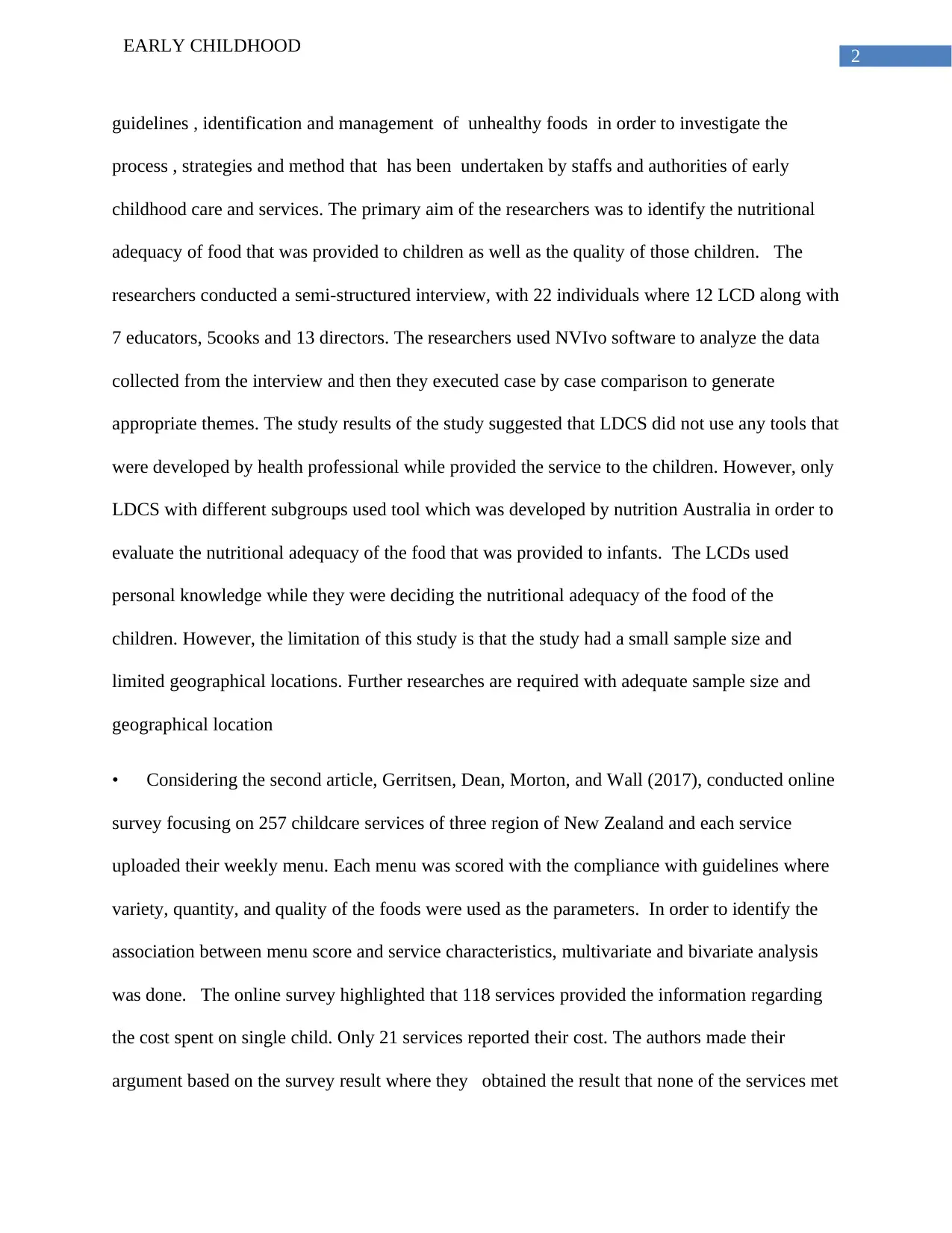
2
EARLY CHILDHOOD
guidelines , identification and management of unhealthy foods in order to investigate the
process , strategies and method that has been undertaken by staffs and authorities of early
childhood care and services. The primary aim of the researchers was to identify the nutritional
adequacy of food that was provided to children as well as the quality of those children. The
researchers conducted a semi-structured interview, with 22 individuals where 12 LCD along with
7 educators, 5cooks and 13 directors. The researchers used NVIvo software to analyze the data
collected from the interview and then they executed case by case comparison to generate
appropriate themes. The study results of the study suggested that LDCS did not use any tools that
were developed by health professional while provided the service to the children. However, only
LDCS with different subgroups used tool which was developed by nutrition Australia in order to
evaluate the nutritional adequacy of the food that was provided to infants. The LCDs used
personal knowledge while they were deciding the nutritional adequacy of the food of the
children. However, the limitation of this study is that the study had a small sample size and
limited geographical locations. Further researches are required with adequate sample size and
geographical location
• Considering the second article, Gerritsen, Dean, Morton, and Wall (2017), conducted online
survey focusing on 257 childcare services of three region of New Zealand and each service
uploaded their weekly menu. Each menu was scored with the compliance with guidelines where
variety, quantity, and quality of the foods were used as the parameters. In order to identify the
association between menu score and service characteristics, multivariate and bivariate analysis
was done. The online survey highlighted that 118 services provided the information regarding
the cost spent on single child. Only 21 services reported their cost. The authors made their
argument based on the survey result where they obtained the result that none of the services met
EARLY CHILDHOOD
guidelines , identification and management of unhealthy foods in order to investigate the
process , strategies and method that has been undertaken by staffs and authorities of early
childhood care and services. The primary aim of the researchers was to identify the nutritional
adequacy of food that was provided to children as well as the quality of those children. The
researchers conducted a semi-structured interview, with 22 individuals where 12 LCD along with
7 educators, 5cooks and 13 directors. The researchers used NVIvo software to analyze the data
collected from the interview and then they executed case by case comparison to generate
appropriate themes. The study results of the study suggested that LDCS did not use any tools that
were developed by health professional while provided the service to the children. However, only
LDCS with different subgroups used tool which was developed by nutrition Australia in order to
evaluate the nutritional adequacy of the food that was provided to infants. The LCDs used
personal knowledge while they were deciding the nutritional adequacy of the food of the
children. However, the limitation of this study is that the study had a small sample size and
limited geographical locations. Further researches are required with adequate sample size and
geographical location
• Considering the second article, Gerritsen, Dean, Morton, and Wall (2017), conducted online
survey focusing on 257 childcare services of three region of New Zealand and each service
uploaded their weekly menu. Each menu was scored with the compliance with guidelines where
variety, quantity, and quality of the foods were used as the parameters. In order to identify the
association between menu score and service characteristics, multivariate and bivariate analysis
was done. The online survey highlighted that 118 services provided the information regarding
the cost spent on single child. Only 21 services reported their cost. The authors made their
argument based on the survey result where they obtained the result that none of the services met
⊘ This is a preview!⊘
Do you want full access?
Subscribe today to unlock all pages.

Trusted by 1+ million students worldwide
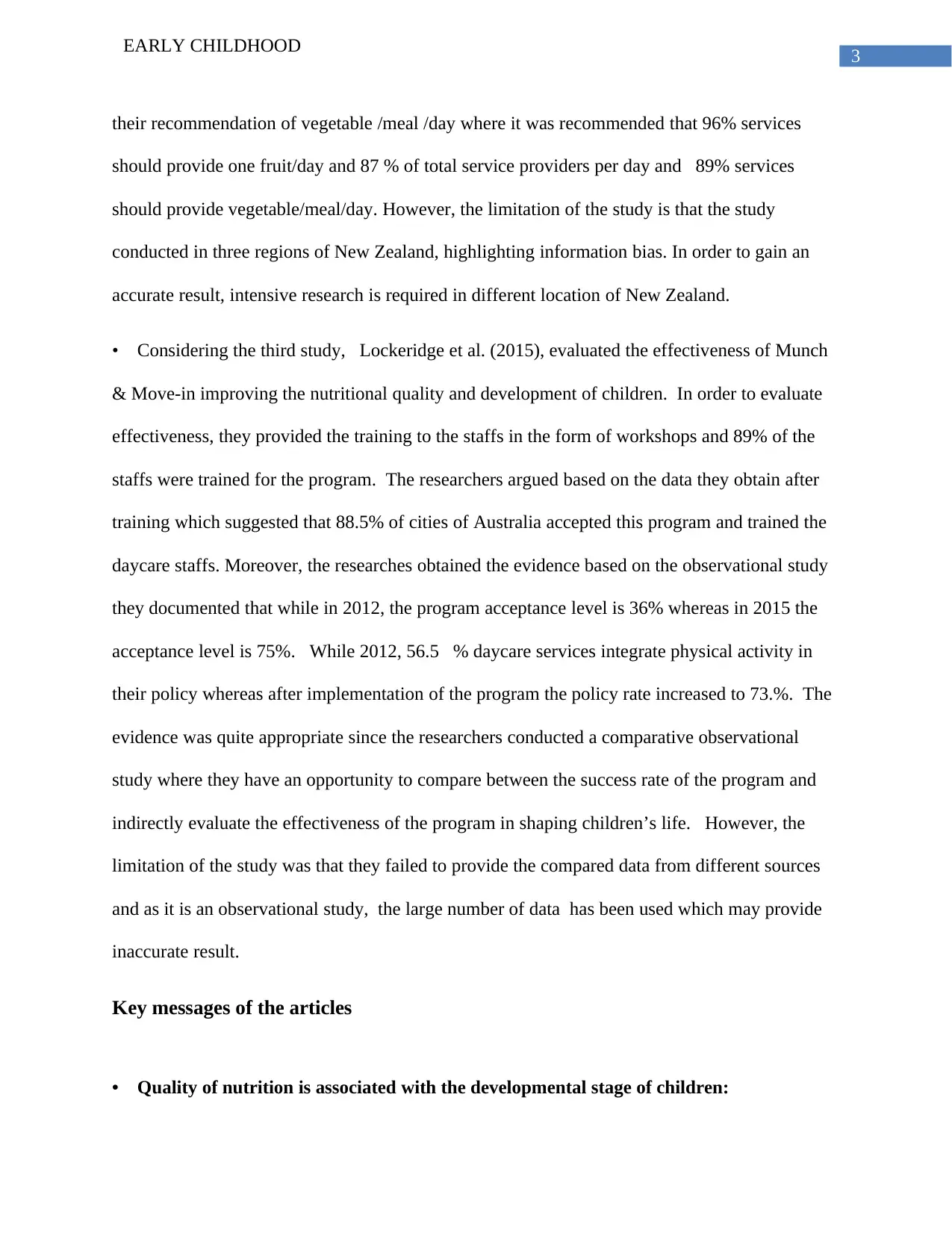
3
EARLY CHILDHOOD
their recommendation of vegetable /meal /day where it was recommended that 96% services
should provide one fruit/day and 87 % of total service providers per day and 89% services
should provide vegetable/meal/day. However, the limitation of the study is that the study
conducted in three regions of New Zealand, highlighting information bias. In order to gain an
accurate result, intensive research is required in different location of New Zealand.
• Considering the third study, Lockeridge et al. (2015), evaluated the effectiveness of Munch
& Move-in improving the nutritional quality and development of children. In order to evaluate
effectiveness, they provided the training to the staffs in the form of workshops and 89% of the
staffs were trained for the program. The researchers argued based on the data they obtain after
training which suggested that 88.5% of cities of Australia accepted this program and trained the
daycare staffs. Moreover, the researches obtained the evidence based on the observational study
they documented that while in 2012, the program acceptance level is 36% whereas in 2015 the
acceptance level is 75%. While 2012, 56.5 % daycare services integrate physical activity in
their policy whereas after implementation of the program the policy rate increased to 73.%. The
evidence was quite appropriate since the researchers conducted a comparative observational
study where they have an opportunity to compare between the success rate of the program and
indirectly evaluate the effectiveness of the program in shaping children’s life. However, the
limitation of the study was that they failed to provide the compared data from different sources
and as it is an observational study, the large number of data has been used which may provide
inaccurate result.
Key messages of the articles
• Quality of nutrition is associated with the developmental stage of children:
EARLY CHILDHOOD
their recommendation of vegetable /meal /day where it was recommended that 96% services
should provide one fruit/day and 87 % of total service providers per day and 89% services
should provide vegetable/meal/day. However, the limitation of the study is that the study
conducted in three regions of New Zealand, highlighting information bias. In order to gain an
accurate result, intensive research is required in different location of New Zealand.
• Considering the third study, Lockeridge et al. (2015), evaluated the effectiveness of Munch
& Move-in improving the nutritional quality and development of children. In order to evaluate
effectiveness, they provided the training to the staffs in the form of workshops and 89% of the
staffs were trained for the program. The researchers argued based on the data they obtain after
training which suggested that 88.5% of cities of Australia accepted this program and trained the
daycare staffs. Moreover, the researches obtained the evidence based on the observational study
they documented that while in 2012, the program acceptance level is 36% whereas in 2015 the
acceptance level is 75%. While 2012, 56.5 % daycare services integrate physical activity in
their policy whereas after implementation of the program the policy rate increased to 73.%. The
evidence was quite appropriate since the researchers conducted a comparative observational
study where they have an opportunity to compare between the success rate of the program and
indirectly evaluate the effectiveness of the program in shaping children’s life. However, the
limitation of the study was that they failed to provide the compared data from different sources
and as it is an observational study, the large number of data has been used which may provide
inaccurate result.
Key messages of the articles
• Quality of nutrition is associated with the developmental stage of children:
Paraphrase This Document
Need a fresh take? Get an instant paraphrase of this document with our AI Paraphraser
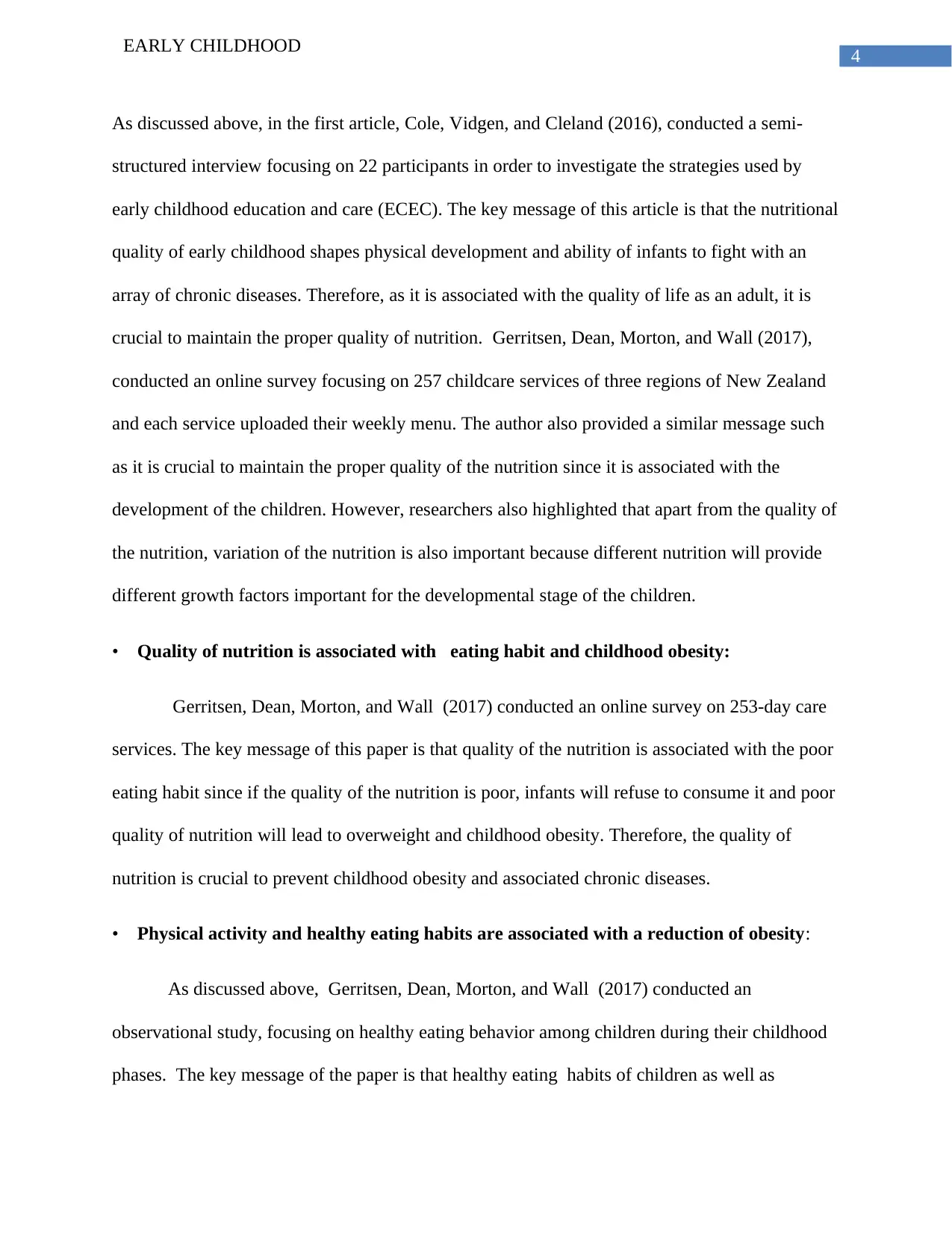
4
EARLY CHILDHOOD
As discussed above, in the first article, Cole, Vidgen, and Cleland (2016), conducted a semi-
structured interview focusing on 22 participants in order to investigate the strategies used by
early childhood education and care (ECEC). The key message of this article is that the nutritional
quality of early childhood shapes physical development and ability of infants to fight with an
array of chronic diseases. Therefore, as it is associated with the quality of life as an adult, it is
crucial to maintain the proper quality of nutrition. Gerritsen, Dean, Morton, and Wall (2017),
conducted an online survey focusing on 257 childcare services of three regions of New Zealand
and each service uploaded their weekly menu. The author also provided a similar message such
as it is crucial to maintain the proper quality of the nutrition since it is associated with the
development of the children. However, researchers also highlighted that apart from the quality of
the nutrition, variation of the nutrition is also important because different nutrition will provide
different growth factors important for the developmental stage of the children.
• Quality of nutrition is associated with eating habit and childhood obesity:
Gerritsen, Dean, Morton, and Wall (2017) conducted an online survey on 253-day care
services. The key message of this paper is that quality of the nutrition is associated with the poor
eating habit since if the quality of the nutrition is poor, infants will refuse to consume it and poor
quality of nutrition will lead to overweight and childhood obesity. Therefore, the quality of
nutrition is crucial to prevent childhood obesity and associated chronic diseases.
• Physical activity and healthy eating habits are associated with a reduction of obesity:
As discussed above, Gerritsen, Dean, Morton, and Wall (2017) conducted an
observational study, focusing on healthy eating behavior among children during their childhood
phases. The key message of the paper is that healthy eating habits of children as well as
EARLY CHILDHOOD
As discussed above, in the first article, Cole, Vidgen, and Cleland (2016), conducted a semi-
structured interview focusing on 22 participants in order to investigate the strategies used by
early childhood education and care (ECEC). The key message of this article is that the nutritional
quality of early childhood shapes physical development and ability of infants to fight with an
array of chronic diseases. Therefore, as it is associated with the quality of life as an adult, it is
crucial to maintain the proper quality of nutrition. Gerritsen, Dean, Morton, and Wall (2017),
conducted an online survey focusing on 257 childcare services of three regions of New Zealand
and each service uploaded their weekly menu. The author also provided a similar message such
as it is crucial to maintain the proper quality of the nutrition since it is associated with the
development of the children. However, researchers also highlighted that apart from the quality of
the nutrition, variation of the nutrition is also important because different nutrition will provide
different growth factors important for the developmental stage of the children.
• Quality of nutrition is associated with eating habit and childhood obesity:
Gerritsen, Dean, Morton, and Wall (2017) conducted an online survey on 253-day care
services. The key message of this paper is that quality of the nutrition is associated with the poor
eating habit since if the quality of the nutrition is poor, infants will refuse to consume it and poor
quality of nutrition will lead to overweight and childhood obesity. Therefore, the quality of
nutrition is crucial to prevent childhood obesity and associated chronic diseases.
• Physical activity and healthy eating habits are associated with a reduction of obesity:
As discussed above, Gerritsen, Dean, Morton, and Wall (2017) conducted an
observational study, focusing on healthy eating behavior among children during their childhood
phases. The key message of the paper is that healthy eating habits of children as well as
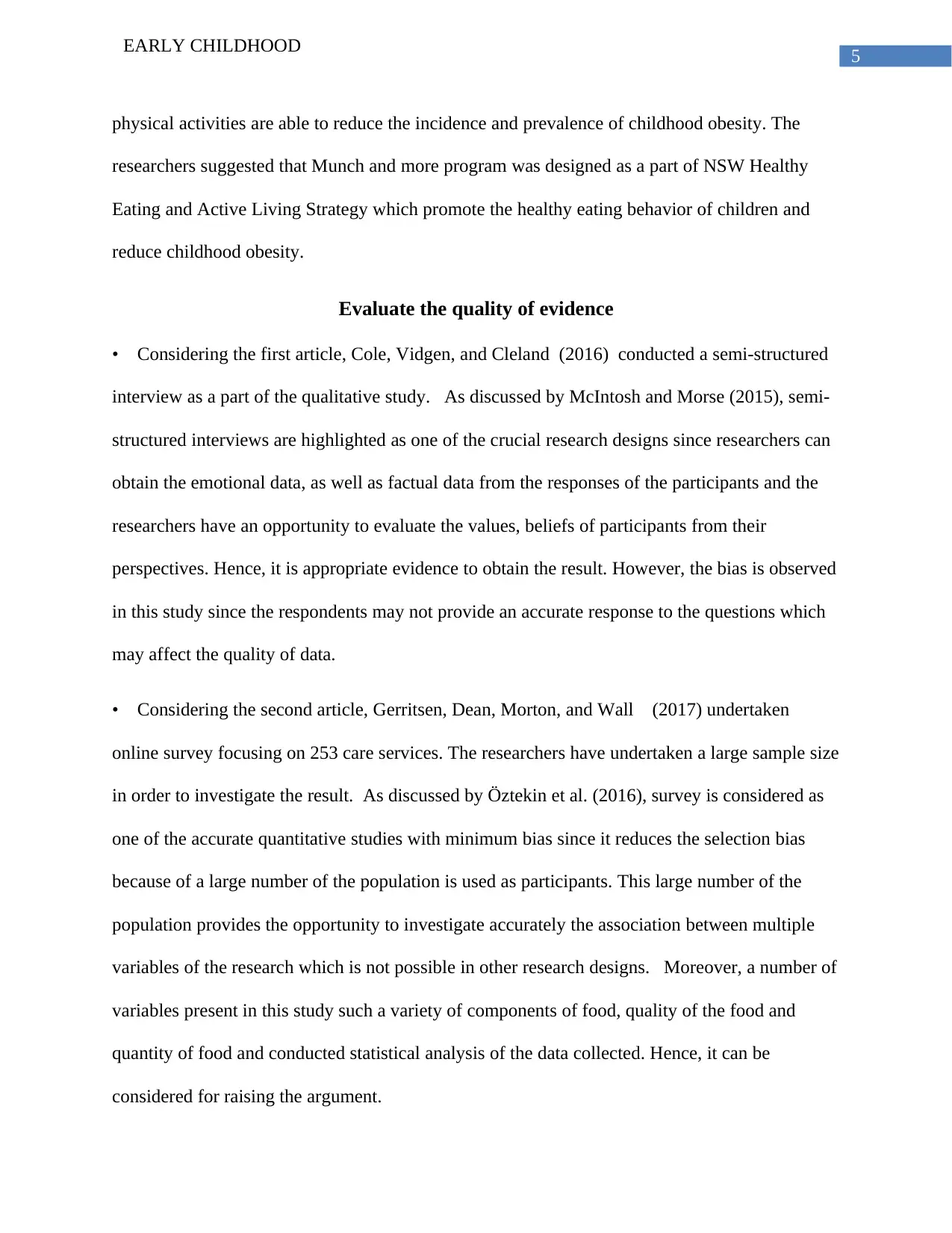
5
EARLY CHILDHOOD
physical activities are able to reduce the incidence and prevalence of childhood obesity. The
researchers suggested that Munch and more program was designed as a part of NSW Healthy
Eating and Active Living Strategy which promote the healthy eating behavior of children and
reduce childhood obesity.
Evaluate the quality of evidence
• Considering the first article, Cole, Vidgen, and Cleland (2016) conducted a semi-structured
interview as a part of the qualitative study. As discussed by McIntosh and Morse (2015), semi-
structured interviews are highlighted as one of the crucial research designs since researchers can
obtain the emotional data, as well as factual data from the responses of the participants and the
researchers have an opportunity to evaluate the values, beliefs of participants from their
perspectives. Hence, it is appropriate evidence to obtain the result. However, the bias is observed
in this study since the respondents may not provide an accurate response to the questions which
may affect the quality of data.
• Considering the second article, Gerritsen, Dean, Morton, and Wall (2017) undertaken
online survey focusing on 253 care services. The researchers have undertaken a large sample size
in order to investigate the result. As discussed by Öztekin et al. (2016), survey is considered as
one of the accurate quantitative studies with minimum bias since it reduces the selection bias
because of a large number of the population is used as participants. This large number of the
population provides the opportunity to investigate accurately the association between multiple
variables of the research which is not possible in other research designs. Moreover, a number of
variables present in this study such a variety of components of food, quality of the food and
quantity of food and conducted statistical analysis of the data collected. Hence, it can be
considered for raising the argument.
EARLY CHILDHOOD
physical activities are able to reduce the incidence and prevalence of childhood obesity. The
researchers suggested that Munch and more program was designed as a part of NSW Healthy
Eating and Active Living Strategy which promote the healthy eating behavior of children and
reduce childhood obesity.
Evaluate the quality of evidence
• Considering the first article, Cole, Vidgen, and Cleland (2016) conducted a semi-structured
interview as a part of the qualitative study. As discussed by McIntosh and Morse (2015), semi-
structured interviews are highlighted as one of the crucial research designs since researchers can
obtain the emotional data, as well as factual data from the responses of the participants and the
researchers have an opportunity to evaluate the values, beliefs of participants from their
perspectives. Hence, it is appropriate evidence to obtain the result. However, the bias is observed
in this study since the respondents may not provide an accurate response to the questions which
may affect the quality of data.
• Considering the second article, Gerritsen, Dean, Morton, and Wall (2017) undertaken
online survey focusing on 253 care services. The researchers have undertaken a large sample size
in order to investigate the result. As discussed by Öztekin et al. (2016), survey is considered as
one of the accurate quantitative studies with minimum bias since it reduces the selection bias
because of a large number of the population is used as participants. This large number of the
population provides the opportunity to investigate accurately the association between multiple
variables of the research which is not possible in other research designs. Moreover, a number of
variables present in this study such a variety of components of food, quality of the food and
quantity of food and conducted statistical analysis of the data collected. Hence, it can be
considered for raising the argument.
⊘ This is a preview!⊘
Do you want full access?
Subscribe today to unlock all pages.

Trusted by 1+ million students worldwide
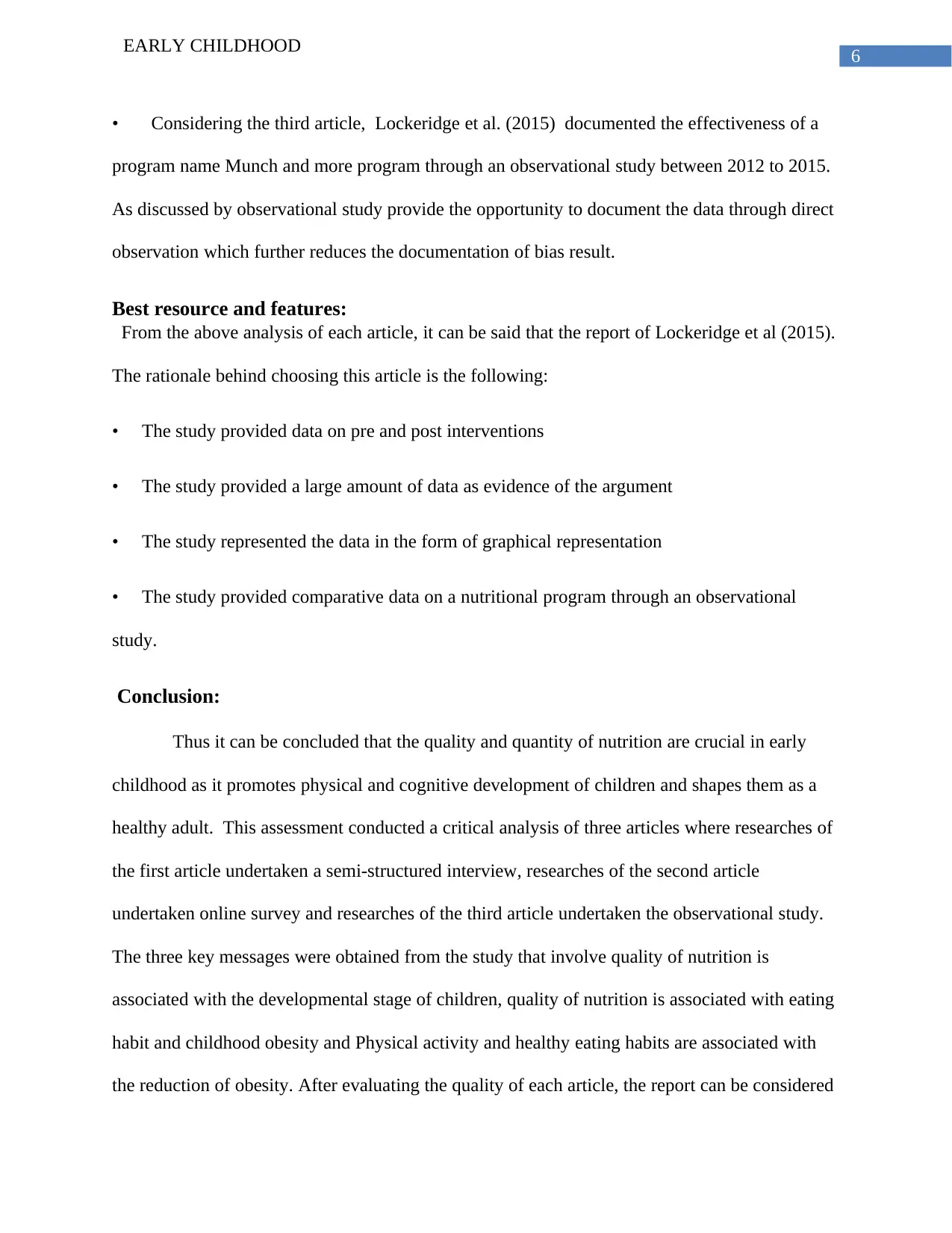
6
EARLY CHILDHOOD
• Considering the third article, Lockeridge et al. (2015) documented the effectiveness of a
program name Munch and more program through an observational study between 2012 to 2015.
As discussed by observational study provide the opportunity to document the data through direct
observation which further reduces the documentation of bias result.
Best resource and features:
From the above analysis of each article, it can be said that the report of Lockeridge et al (2015).
The rationale behind choosing this article is the following:
• The study provided data on pre and post interventions
• The study provided a large amount of data as evidence of the argument
• The study represented the data in the form of graphical representation
• The study provided comparative data on a nutritional program through an observational
study.
Conclusion:
Thus it can be concluded that the quality and quantity of nutrition are crucial in early
childhood as it promotes physical and cognitive development of children and shapes them as a
healthy adult. This assessment conducted a critical analysis of three articles where researches of
the first article undertaken a semi-structured interview, researches of the second article
undertaken online survey and researches of the third article undertaken the observational study.
The three key messages were obtained from the study that involve quality of nutrition is
associated with the developmental stage of children, quality of nutrition is associated with eating
habit and childhood obesity and Physical activity and healthy eating habits are associated with
the reduction of obesity. After evaluating the quality of each article, the report can be considered
EARLY CHILDHOOD
• Considering the third article, Lockeridge et al. (2015) documented the effectiveness of a
program name Munch and more program through an observational study between 2012 to 2015.
As discussed by observational study provide the opportunity to document the data through direct
observation which further reduces the documentation of bias result.
Best resource and features:
From the above analysis of each article, it can be said that the report of Lockeridge et al (2015).
The rationale behind choosing this article is the following:
• The study provided data on pre and post interventions
• The study provided a large amount of data as evidence of the argument
• The study represented the data in the form of graphical representation
• The study provided comparative data on a nutritional program through an observational
study.
Conclusion:
Thus it can be concluded that the quality and quantity of nutrition are crucial in early
childhood as it promotes physical and cognitive development of children and shapes them as a
healthy adult. This assessment conducted a critical analysis of three articles where researches of
the first article undertaken a semi-structured interview, researches of the second article
undertaken online survey and researches of the third article undertaken the observational study.
The three key messages were obtained from the study that involve quality of nutrition is
associated with the developmental stage of children, quality of nutrition is associated with eating
habit and childhood obesity and Physical activity and healthy eating habits are associated with
the reduction of obesity. After evaluating the quality of each article, the report can be considered
Paraphrase This Document
Need a fresh take? Get an instant paraphrase of this document with our AI Paraphraser

7
EARLY CHILDHOOD
as the best resource out of three resources since it provided a large amount of data in graphs and
table which further provided the accurate data regarding nutritional quality in early childhood.
Therefore, it can be used as potential evidence for literature for reducing childhood obesity and
promoting the physical activity in early childhood.
EARLY CHILDHOOD
as the best resource out of three resources since it provided a large amount of data in graphs and
table which further provided the accurate data regarding nutritional quality in early childhood.
Therefore, it can be used as potential evidence for literature for reducing childhood obesity and
promoting the physical activity in early childhood.
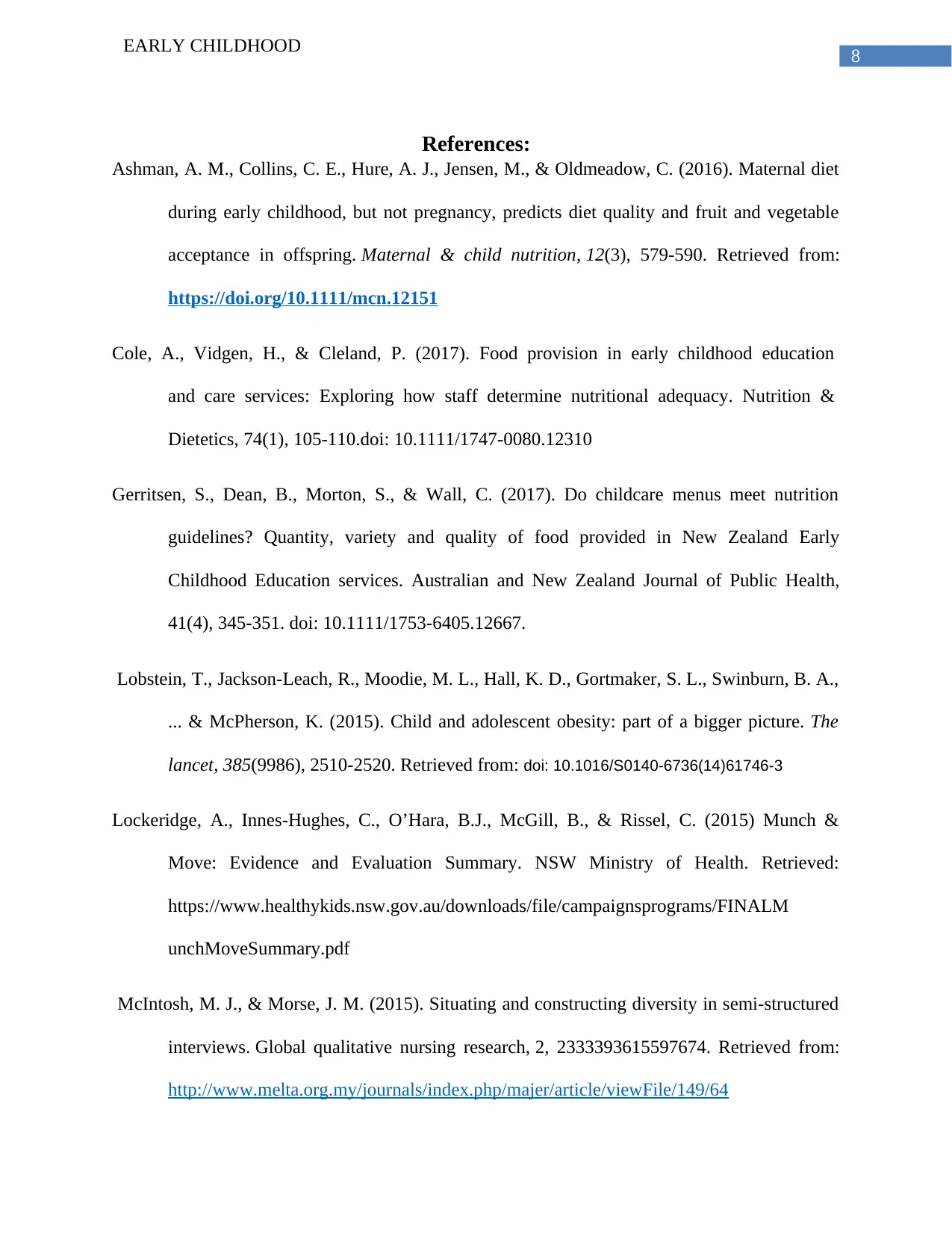
8
EARLY CHILDHOOD
References:
Ashman, A. M., Collins, C. E., Hure, A. J., Jensen, M., & Oldmeadow, C. (2016). Maternal diet
during early childhood, but not pregnancy, predicts diet quality and fruit and vegetable
acceptance in offspring. Maternal & child nutrition, 12(3), 579-590. Retrieved from:
https://doi.org/10.1111/mcn.12151
Cole, A., Vidgen, H., & Cleland, P. (2017). Food provision in early childhood education
and care services: Exploring how staff determine nutritional adequacy. Nutrition &
Dietetics, 74(1), 105-110.doi: 10.1111/1747-0080.12310
Gerritsen, S., Dean, B., Morton, S., & Wall, C. (2017). Do childcare menus meet nutrition
guidelines? Quantity, variety and quality of food provided in New Zealand Early
Childhood Education services. Australian and New Zealand Journal of Public Health,
41(4), 345-351. doi: 10.1111/1753-6405.12667.
Lobstein, T., Jackson-Leach, R., Moodie, M. L., Hall, K. D., Gortmaker, S. L., Swinburn, B. A.,
... & McPherson, K. (2015). Child and adolescent obesity: part of a bigger picture. The
lancet, 385(9986), 2510-2520. Retrieved from: doi: 10.1016/S0140-6736(14)61746-3
Lockeridge, A., Innes-Hughes, C., O’Hara, B.J., McGill, B., & Rissel, C. (2015) Munch &
Move: Evidence and Evaluation Summary. NSW Ministry of Health. Retrieved:
https://www.healthykids.nsw.gov.au/downloads/file/campaignsprograms/FINALM
unchMoveSummary.pdf
McIntosh, M. J., & Morse, J. M. (2015). Situating and constructing diversity in semi-structured
interviews. Global qualitative nursing research, 2, 2333393615597674. Retrieved from:
http://www.melta.org.my/journals/index.php/majer/article/viewFile/149/64
EARLY CHILDHOOD
References:
Ashman, A. M., Collins, C. E., Hure, A. J., Jensen, M., & Oldmeadow, C. (2016). Maternal diet
during early childhood, but not pregnancy, predicts diet quality and fruit and vegetable
acceptance in offspring. Maternal & child nutrition, 12(3), 579-590. Retrieved from:
https://doi.org/10.1111/mcn.12151
Cole, A., Vidgen, H., & Cleland, P. (2017). Food provision in early childhood education
and care services: Exploring how staff determine nutritional adequacy. Nutrition &
Dietetics, 74(1), 105-110.doi: 10.1111/1747-0080.12310
Gerritsen, S., Dean, B., Morton, S., & Wall, C. (2017). Do childcare menus meet nutrition
guidelines? Quantity, variety and quality of food provided in New Zealand Early
Childhood Education services. Australian and New Zealand Journal of Public Health,
41(4), 345-351. doi: 10.1111/1753-6405.12667.
Lobstein, T., Jackson-Leach, R., Moodie, M. L., Hall, K. D., Gortmaker, S. L., Swinburn, B. A.,
... & McPherson, K. (2015). Child and adolescent obesity: part of a bigger picture. The
lancet, 385(9986), 2510-2520. Retrieved from: doi: 10.1016/S0140-6736(14)61746-3
Lockeridge, A., Innes-Hughes, C., O’Hara, B.J., McGill, B., & Rissel, C. (2015) Munch &
Move: Evidence and Evaluation Summary. NSW Ministry of Health. Retrieved:
https://www.healthykids.nsw.gov.au/downloads/file/campaignsprograms/FINALM
unchMoveSummary.pdf
McIntosh, M. J., & Morse, J. M. (2015). Situating and constructing diversity in semi-structured
interviews. Global qualitative nursing research, 2, 2333393615597674. Retrieved from:
http://www.melta.org.my/journals/index.php/majer/article/viewFile/149/64
⊘ This is a preview!⊘
Do you want full access?
Subscribe today to unlock all pages.

Trusted by 1+ million students worldwide
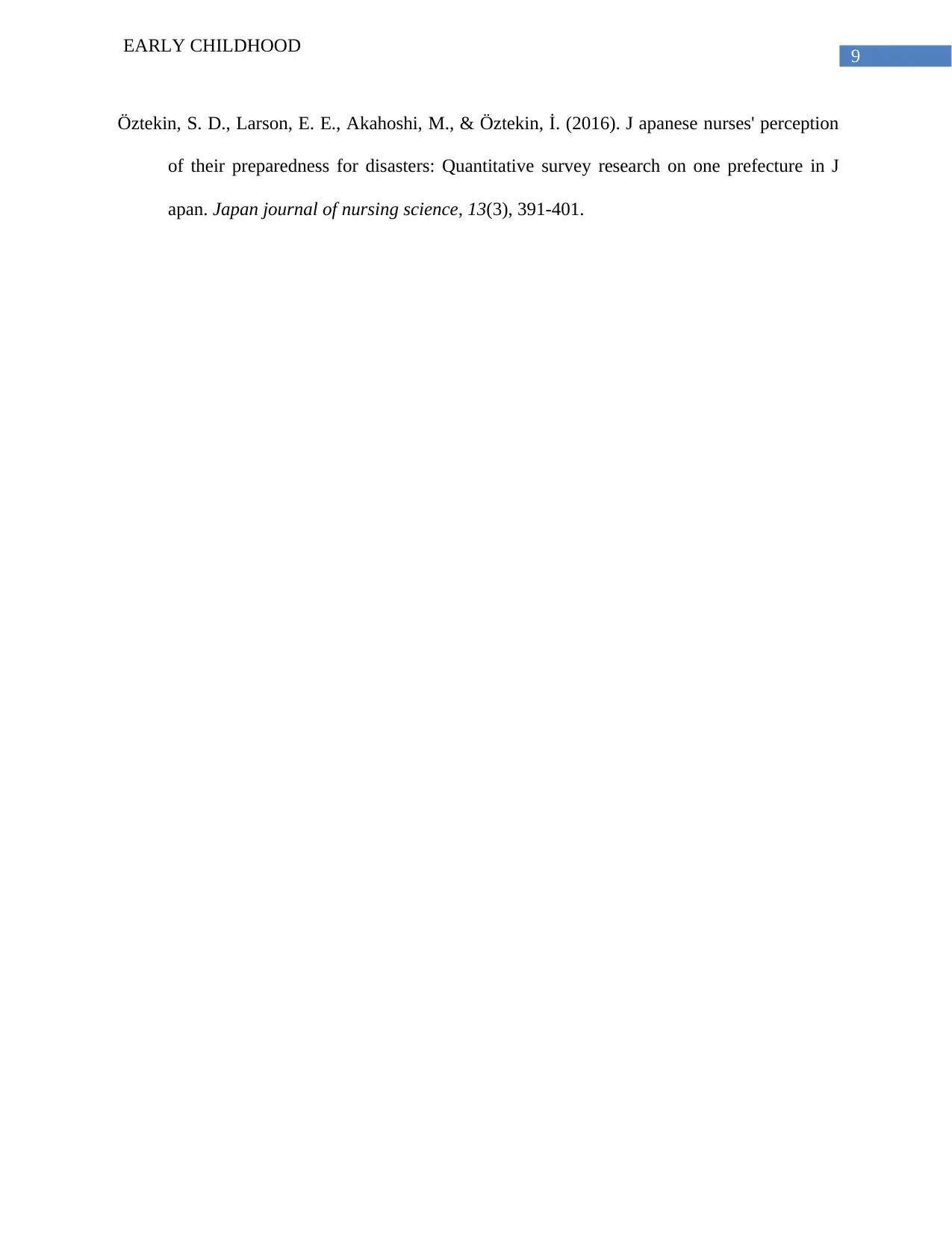
9
EARLY CHILDHOOD
Öztekin, S. D., Larson, E. E., Akahoshi, M., & Öztekin, İ. (2016). J apanese nurses' perception
of their preparedness for disasters: Quantitative survey research on one prefecture in J
apan. Japan journal of nursing science, 13(3), 391-401.
EARLY CHILDHOOD
Öztekin, S. D., Larson, E. E., Akahoshi, M., & Öztekin, İ. (2016). J apanese nurses' perception
of their preparedness for disasters: Quantitative survey research on one prefecture in J
apan. Japan journal of nursing science, 13(3), 391-401.
1 out of 10
Your All-in-One AI-Powered Toolkit for Academic Success.
+13062052269
info@desklib.com
Available 24*7 on WhatsApp / Email
![[object Object]](/_next/static/media/star-bottom.7253800d.svg)
Unlock your academic potential
Copyright © 2020–2026 A2Z Services. All Rights Reserved. Developed and managed by ZUCOL.

